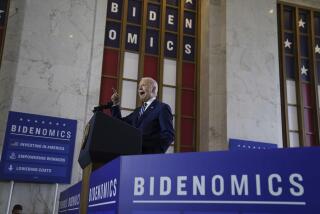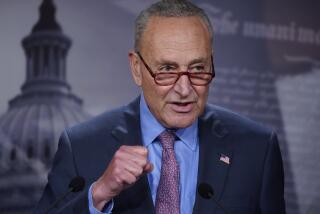Obama makes priority clear
- Share via
CHICAGO — Sending a strong message that the faltering economy will be his top focus, President-elect Barack Obama on Friday urged Congress to pass an economic stimulus package before he takes office. If lawmakers fail to act, he said, he will make it “the first thing” he gets done.
Obama made his first public appearance since his victory Tuesday night, using his opening remarks at a news conference to underscore the “sobering news” that the nation lost 240,000 jobs in October. Flanking Obama were 16 of his economic advisors, a heavyweight cast of former Treasury secretaries, business leaders and financial experts. Obama had presided over a meeting with the group earlier in the day.
Obama offered few concrete details of his approach to the economy. He said he wanted to extend the period that jobless workers can receive unemployment benefits, and come up with ways to help the auto industry survive the economic downturn and develop more fuel-efficient cars.
But he advised Americans not to expect a speedy, painless recovery.
“It is not going to be quick and it is not going to be easy for us to dig ourselves out of the hole that we are in, but America is a strong and resilient country,” Obama said. “And I know we will succeed if we put aside partisanship and politics and work together as one nation. That’s what I intend to do.”
Obama’s hopes for another stimulus plan square with those of congressional Democratic leaders. House Speaker Nancy Pelosi and Senate Majority Leader Harry Reid want to see a stimulus package of about $60 billion to $100 billion passed this year.
Jim Manley, a spokesman for Reid, said the question was whether Republicans or the Bush White House would block such an effort.
Reid and Pelosi “strongly support the need for an additional stimulus package,” Manley said. “Hopefully, we can pass one this year in the so-called lame-duck session. If not, we’ll work with President-elect Obama to get it done as quickly as possible next year.”
Taking questions from reporters, Obama was by turns serious and playful. He committed his first gaffe as president-elect when answering a question about his preparations for the job. Asked whether he had spoken to past presidents, Obama said he had talked to “all of them that are living.” As an aside, he said: “I didn’t want to get into a Nancy Reagan thing about, you know, doing any seances.” As first lady, Nancy Reagan spoke to an astrologer in setting former President Reagan’s schedule.
Obama later called the former first lady to apologize for the “careless and offhanded remark he made,” according to a statement released by his staff.
At the news conference, Obama offered a few details about a subject of intense national curiosity since his victory speech: the search for a family dog.
A new puppy was Obama’s promise to his daughters, Malia, 10, and Sasha, 7.
“With respect to the dog, this is a major issue,” Obama quipped.
“Malia is allergic, so it has to be hypoallergenic. There are a number of breeds that are hypoallergenic,” he said. “On the other hand, our preference would be to get a shelter dog, but obviously a lot of shelter dogs are mutts, like me. So whether we’re going to be able to balance those two things, I think, is a pressing issue on the Obama household.”
In the foreign policy realm, Obama reiterated that he wanted international pressure leveled against the Iranians to prevent their development of a nuclear weapon. He also suggested that he was in no hurry to engage in direct talks with Tehran.
During the campaign, Obama faced criticism for saying he would be willing to meet with leaders of nations hostile to the U.S. without preconditions.
Obama said he was still mulling over how to respond to a congratulatory note sent by Iran’s president, Mahmoud Ahmadinejad. He said he would “respond appropriately.”
“It’s only been three days since the election,” Obama said. “Obviously, how we approach and deal with a country like Iran is not something that we should . . . do in a knee-jerk fashion. I think we’ve got to think it through.
“But I have to reiterate once again that we only have one president at a time. And I want to be very careful that we are sending the right signals to the world as a whole that I am not the president, and I won’t be until Jan. 20.”
To date, Obama has announced only one appointment -- Rep. Rahm Emanuel (D-Ill.) as his new chief of staff. Advisors said Obama would move swiftly to name secretaries of the Treasury and Homeland Security, given the volatile economic climate and chronic worries about the nation’s safety.
Obama said, though, that he did not want to act with undue haste.
“I think it’s very important in all these key positions, both in the economic team and the national security team, to -- to get it right and -- and not to be so rushed that you end up making mistakes. I’m confident that we’re going to have an outstanding team, and we will be rolling that out in subsequent weeks.”
Speculation is churning about the next Defense secretary. One person who was briefed on the search for a new Pentagon chief said the candidates included the incumbent secretary, Robert M. Gates; former Sen. Sam Nunn (D-Ga.); Sen. Jack Reed (D-R.I.); and Richard Danzig, secretary of the Navy under President Clinton.
Gates’ prospects seem to be dimming, though. Were Obama to keep him, it might be difficult to replace the people under him, the source said.
Obama’s meeting Friday with his Transition Economic Advisory Board came as the Bush administration is launching a $700-billion bailout for financial markets rocked by staggering losses stemming largely from bad real estate loans.
White House spokesman Tony Fratto said Friday that Treasury Secretary Henry M. Paulson was sharing information with Obama’s transition team and was “very interested in how the next administration will deal with the economic plans that he’s putting in place.”
“Remember, these are programs he’s putting in place to deal with systemic risk in financial markets, and the last thing financial markets need right now is confusing signals and programs that might be started and changed in a very short time,” Fratto said.
Obama said he would monitor how the programs were instituted, making sure they were stabilizing markets, protecting taxpayers and helping homeowners without “unduly rewarding the management” of firms that receive public aid.
On top of the job-loss report, Obama’s first news conference came as the automakers announced deep third-quarter losses: a $2.5-billion net loss for GM and $129 million for Ford. The companies also reported that they had burned through $14.6 billion in cash.
The companies, which can access $25 billion in low-cost loans from the federal government, have appealed to Washington for more help.
On Friday, Obama called the industry the “backbone of American manufacturing,” and said: “I have made it a high priority for my transition team to work on additional policy options to help the auto industry adjust, weather the financial crisis and succeed in producing fuel-efficient cars here in the United States of America.”
Now that the long campaign is over, Obama has dropped the partisan tone of the campaign trail. He avoided any criticism of President Bush -- a favorite target during the campaign.
Obama also said he appreciated the president’s “commitment to ensuring that his economic policy team keeps us fully informed as developments unfold.”
On Monday, Obama and his wife, Michelle, will visit with the president and First Lady Laura Bush at the White House. Obama and Bush will then meet privately in the Oval Office to discuss the economy and the Iraq war.
“Now is a good time for us to set politics aside for a while and think practically about what will actually work to move the economy forward,” Obama said. “And it’s in that spirit that I’ll have the conversation with the president.”
Obama’s economic advisory board includes a number of major financial backers, including Chicago billionaire Penny Pritzker, who donated $37,500; Google Chairman Eric Schmidt, whose employees donated $727,000; and Citigroup Chairman Robert E. Rubin, who gave $35,600, while employees of the company donated $460,000.
After the meeting, Los Angeles Mayor Antonio Villaraigosa, who is also on the economic advisory board, echoed Obama’s call for new federal spending on road-building and other infrastructure projects. Over the last eight years, aid to cities and counties has been abysmal, he said.
“What I heard today,” Villaraigosa said, “was a president-elect who is going to rectify that and make sure we’re doing everything we can to invest in cities.”
--
Times staff writers Dan Morain, Paul Richter, Richard Simon and Peter Spiegel contributed to this report.
--
(BEGIN TEXT OF INFOBOX)
Economic advisors
President-elect Barack Obama has assembled a Transition Economic Advisory Board to advise him on the economic crisis. Before his first news conference as president- elect,
he met Friday with its members:
David E. Bonior, former U.S. representative (D-Mich.)
Warren Buffett, chairman and chief executive of Berkshire Hathaway
Roel C. Campos, former Democratic member of the Securities and Exchange Commission
William Daley, Commerce secretary under President Clinton
William H. Donaldson, SEC chairman under President Bush
Roger Ferguson, former Federal Reserve vice chairman (appointed to the board by Clinton, then Bush), and president and CEO of teachers retirement fund TIAA-CREF
Jennifer M. Granholm, Democratic governor of Michigan
Anne Mulcahy, chairwoman and CEO of Xerox
Richard Parsons, chairman of Time Warner
Penny Pritzker, CEO of Classic Residence by Hyatt
Robert B. Reich, Labor secretary under Clinton
Robert E. Rubin, Treasury secretary under Clinton
Eric Schmidt, chairman and CEO of Google
Lawrence Summers, former president of Harvard and Treasury secretary under Clinton
Laura D’Andrea Tyson, national economic advisor to Clinton
Antonio Villaraigosa, Democratic mayor of Los Angeles
Paul A. Volcker, Fed chairman under Presidents Carter and Reagan
Source: Office of the President-elect
More to Read
Get the L.A. Times Politics newsletter
Deeply reported insights into legislation, politics and policy from Sacramento, Washington and beyond. In your inbox three times per week.
You may occasionally receive promotional content from the Los Angeles Times.











